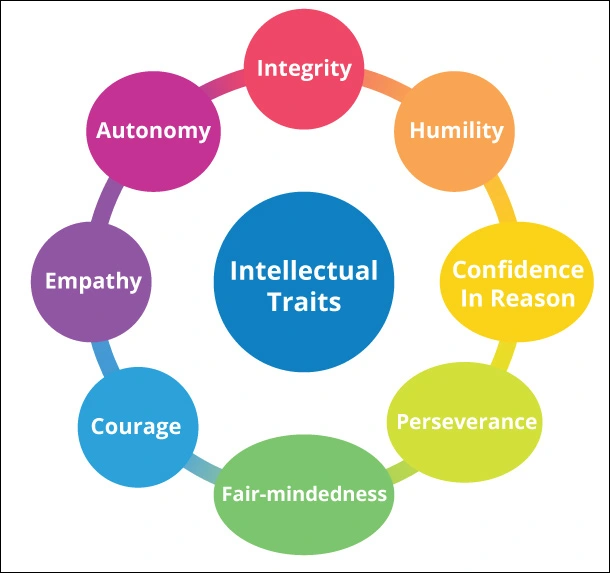Intellectual Traits
If standards of thought are applied, a student has potential to grow into an individual who exhibits the intellectual character described by the Paul- Elder Intellectual Traits. These intellectual traits include intellectual integrity, independence, perseverance, empathy, humility, courage, confidence in reason and fair-mindedness (Figure 1). - By Crest + Oral-B Professional Community
Intellectual Traits
Intellectual integrity – This trait requires that the standards that guide actions and thoughts need to be the same standards by which others are evaluated. An individual exhibiting this trait treats others with kindness while avoiding harm and outwardly projects this trait. This trait eliminates double standards and hypocrisy.
Intellectual autonomy – This trait requires an individual to use critical thinking tools, such as the Paul-Elder model, and to trust their own ability to reason critically. For example, a dental professional exhibiting intellectual autonomy will ask questions about new products and will critically think through all aspects of the products to determine their implications of use. These individuals do not have to rely on others to do their thinking.
Intellectual perseverance – The tag phase for this trait is "never give up" and encourages individuals to work through any difficulties. A clinician exhibiting intellectual perseverance has to depend on their critical thinking toolkit to keep working through challenging patient issues or unfamiliar situations.
Intellectual empathy – An individual achieves intellectual empathy when they actively put themselves in someone else’s shoes in terms of how they think and feel. For instance, a dental clinician may encounter a patient who has a different viewpoint about certain dental preventive agents such as fluoride. A clinician exhibiting intellectual empathy strives to understand the patient’s point of view in order to think fully about the situation before responding to it. While the clinician does not have to agree with your patient’s point of view, intellectual empathy demands that they accurately represent the thinking of a different view despite what they believe.
Intellectual humility – Individuals exhibiting intellectual humility accept they are human and that they do not know everything. They continue to learn and grow as they age. They acknowledge their limitations. Dental professionals exhibiting intellectual humility are okay to tell patients they are not familiar with a certain product, technique, condition or research behind the product or technique, and acknowledge that they are an ongoing learner in the profession.
Intellectual courage – Individuals with intellectual courage stand up for their beliefs and the conclusions they have fully thought through, especially when it is difficult to do so. Sometimes it will not be a popular or common thought, but if they stand up for their beliefs, change can occur.
Confidence in reason and fair-mindedness - Utilizing the elements of thought and the standards will lead to confidence in reason and fair-mindedness and requires individuals to look at all of the evidence and relevant points of views and arrive at conclusions that embodies the intellectual traits. This allows dental professionals with confidence in reason and fair-mindedness to trust, as thinkers, to come to sound conclusions for patient care simply by applying the framework to their thought process.2-6

